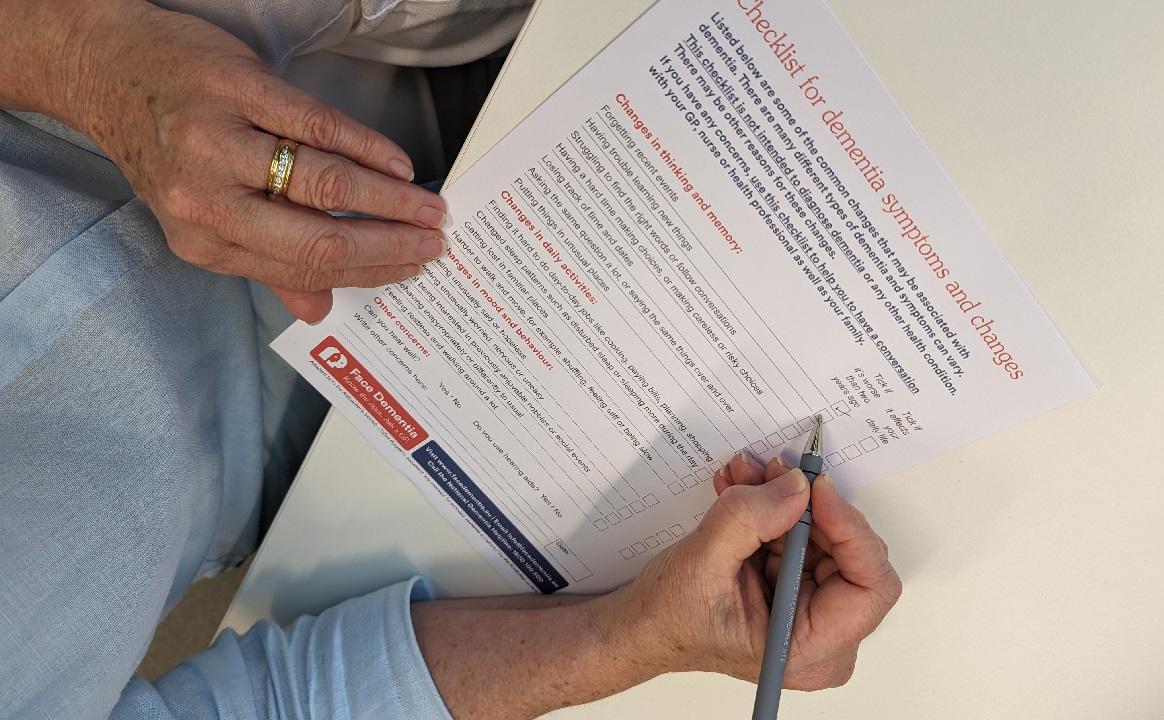Check out the dementia symptom and changes checklist
If you, or someone you know, is experiencing changes in ability, behaviour, personality, thinking or memory, it might be dementia.

Knowing the common signs can help you recognise if you, or a loved one may be experiencing the changes of dementia. Being alert to the range of signs, and noticing any changes, can be key to getting an early dementia diagnosis, treatment and supports.
Download the Face Dementia Checklist for dementia symptoms and changes from the Check for Changes page of this website.
Adelaide resident, Ann Pietsch, was diagnosed with younger onset dementia at age 59, and has this advice for others who might be experiencing changes:
Being proactive about the changes I’d noticed was very important. It meant I sought help, received an early diagnosis, and was taken seriously. My diagnosis allowed me to get the help I needed, and an early diagnosis gave me time to get on with my life.”
Face Dementia was developed in conjunction with people living with dementia, their carers, people concerned about their memory, clinicians and researchers from seven Australian universities. Dementia Australia, and the National Dementia Helpline were important stakeholders in the development process.
Why develop a new checklist?
At three co-design workshops held earlier this year, members of the co-design group expressed the need for a dementia symptom checklist for people concerned about dementia to help identify changes in themselves or someone they care about. They felt this could be used as a tool to start conversations with family members and/or discussed with their GP or health professional.
Professor Kate Laver from Flinders University said,
Some checklists were already available, but the co-design group felt these focussed too heavily on the symptom of memory loss.
They wanted a new checklist that alerted people to other symptoms and changes that could be signs of dementia, in particular changes in daily activities and changes in mood and behaviour.”
Checklist development
A literature review was conducted to identify other international checklists, and 16 were found and mapped against the neurocognitive domains contained in the DSM-5. After further review, the Alzheimer’s Society UK checklist was identified as the most comprehensive, however it needed adaptation for Australia and changes were made to the language and tone. The resulting checklist was re-worked through both co-design and clinical review processes.
About the new checklist
The resulting checklist includes some of the common changes that may be associated with all the different types of dementia as symptoms vary from type-to-type, and person-to-person. It is not intended to diagnose dementia, or any other health condition. It is a tool that can help people to have a conversation with their GP, nurse or health professional as well as their family.
The checklist categorises changes under:
- thinking and memory
- daily activities, and
- mood and behaviour.
It also asks about hearing and whether you wear hearing aids, as hearing loss can significantly increase the risk of developing dementia but wearing hearing aids can reduce your risk.
You can date the checklist and use it to track whether changes have become worse than two years ago, and whether the changes affect your daily life.
The Face Dementia research team appreciates any feedback you have about using the checklist. Please contact us via our contact form.


